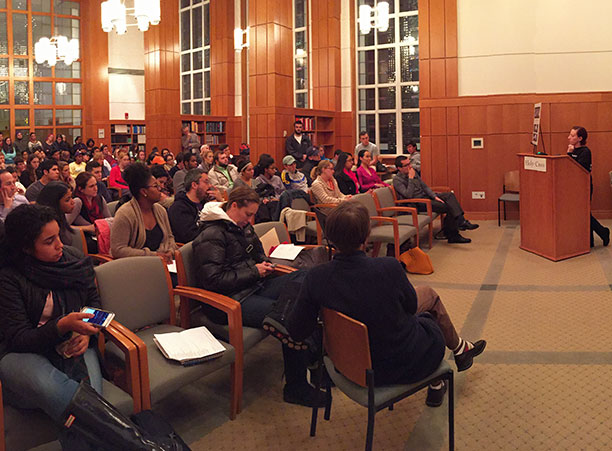
For three hours, Rehm Library was standing room only as members of the College community listened intently. The beautiful space in Smith Hall — so often the scene of intellectual discussions, critical thinking, thought-provoking questions, personal reflections, and emotional discernment — became the venue for conversations that were echoing across the country.
The lack of indictments in the deaths of Michael Brown and Eric Garner has sparked national conversations about issues like police brutality, racial injustice, unconscious bias, and social movements. Similarly, the Holy Cross campus took on those conversations as students, faculty, and staff joined together for a Community Learn-In.
The learn-in, which was inspired by the “teach-ins” of the 1960s, was one of many events designed as “HC in Solidarity” during the week of Dec. 8.
Faculty members from the departments of sociology and anthropology, history, English, economics, and psychology delivered brief lectures on topics such as media representation of Brown’s and Garner’s stories, police militarization, the prison industrial complex, poetry about racial injustice, the science of shooter bias, the racialized nature of the right to bear arms, the economics of discrimination, collective consciousness that leads to collective action, and others.
Visiting assistant professor Stephanie Crist of the sociology and anthropology department, who organized the learn-in, said that “Organizing the event in this manner — short presentations by a number of faculty on campus — was a way for us all to quickly learn about many different academic approaches to understanding racial injustice in the U.S. and also about the ways that communities collectively respond to injustice. It was a vehicle for us to visually and intellectually illustrate to our students that there are many faculty on campus who not only care deeply about injustice, but also have scholarship and teaching in these areas."
Space was created for community members to connect intellectual discourse and emotional reflections. Many students who have been personally affected by the Black Lives Matter movement found support and validation from their community. Other students, who were not previously aware of these issues, were also impacted. A first-year student said, “I think the most important thing to be, at this time, is supportive. There were students sitting in the front row crying … because they … felt so lost in light of previous events. In attending these future seminars, I hope to be supportive for my fellow classmates.”
Community members came together — as professors, students, administrators and primarily, as concerned citizens — to begin to make sense of what has happened, and to work toward positive social change. Social justice is imbedded in the College mission, which calls for community members to be men and women for and with others.
Assistant professor of psychology Stephenie Chaudoir, who participated in the learn-in, reflected on the event and its tie to the College’s mission.
“If one of the major goals of a Jesuit, Catholic, liberal arts education is to equip students with the ability to apply multiple perspectives, weigh evidence, and articulate cogent arguments about emergent and enduring questions of humanity, I think the learn-in was a unique and important space to help us further this goal and show solidarity with our students as we all try to make sense of recent national events,” she said.
A first-year student shared similar sentiments, “I think this event, in addition to recent movements among students, is of critical importance moving forward. The longer we, as a community, stay quiet about these uncomfortable issues, the longer we allow them to continue. This event has been a huge step forward in the student body’s exercise of the Jesuit ideal of being committed to justice.”
HC in Solidarity Events
- Dec. 8: Talent Show presented by the Student Government Association
- Dec. 9: Men's Basketball vs. University of Hartford
- Dec. 9: HC Stands in Solidarity
- Dec. 10: Academic Panel Discussion
- Dec. 11: Community Learn-In
- Dec. 12: Kwanzaa
Related Information

